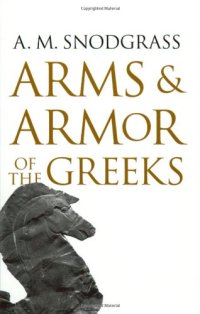
Ebook: Arms and Armor of the Greeks
Author: Anthony M. Snodgrass
- Genre: History
- Tags: Greece, Ancient Civilizations, History, Conventional, Armored Vehicles, Firearms, Weapons & Warfare, Military, History, Engineering, Aerospace, Automotive, Bioengineering, Chemical, Civil & Environmental, Computer Modelling, Construction, Design, Electrical & Electronics, Energy Production & Extraction, Industrial Manufacturing & Operational Systems, Marine Engineering, Materials & Material Science, Mechanical, Military Technology, Reference, Telecommunications & Sensors, Engineering & Transportation
- Year: 1998
- Publisher: The Johns Hopkins University Press
- City: Baltimore
- Language: English
- pdf
“We shall never know how Marathon was won, but we can be fairly certain that valor alone would not have won it, nor even perhaps the combination of courage with the somewhat rudimentary tactical skill for which the style of Greek warfare at that time gave scope. The superiority of Greek equipment must have been an important factor here and elsewhere, and at times perhaps a decisive one.” – from the introduction
In Arms and Armor of the Greeks, Anthony M. Snodgrass uses available literary, archaeological, and artistic evidence to piece together a picture of ancient Greek armory from the Mycenaean period through the campaigns of Alexander the Great. The ancient Greeks were neither populous nor rich in natural resources, Snodgrass explains, so it is remarkable that they succeeded in battle as often as they did.
“Snodgrass’s book on Greek arms and armour must rank already as a standard textbook… It is as clear as any book can be on a surprisingly ill-documented subject.” – Economist
“Helps to explain why (for one thing) the Greeks won the Persian Wars and how they then stuck for centuries, with true military unimaginativeness, to their far from enterprising hoplite phalanx tactics.” – Times Literary Supplement
Reprint of first edition of 1967, published by Thames and Hudson, London.
“We shall never know how Marathon was won, but we can be fairly certain that valor alone would not have won it, nor even perhaps the combination of courage with the somewhat rudimentary tactical skill for which the style of Greek warfare at that time gave scope. The superiority of Greek equipment must have been an important factor here and elsewhere, and at times perhaps a decisive one.” – from the introduction
In Arms and Armor of the Greeks, Anthony M. Snodgrass uses available literary, archaeological, and artistic evidence to piece together a picture of ancient Greek armory from the Mycenaean period through the campaigns of Alexander the Great. The ancient Greeks were neither populous nor rich in natural resources, Snodgrass explains, so it is remarkable that they succeeded in battle as often as they did.
“Snodgrass’s book on Greek arms and armour must rank already as a standard textbook… It is as clear as any book can be on a surprisingly ill-documented subject.” – Economist
“Helps to explain why (for one thing) the Greeks won the Persian Wars and how they then stuck for centuries, with true military unimaginativeness, to their far from enterprising hoplite phalanx tactics.” – Times Literary Supplement
"We shall never know how Marathon was won, but we can be fairly certain that valor alone would not have won it, nor even perhaps the combination of courage with the somewhat rudimentary tactical skill for which the style of Greek warfare at that time gave scope. The superiority of Greek equipment must have been an important factor here and elsewhere, and at times perhaps a decisive one."--from the introduction
In Arms and Armor of the Greeks, Anthony M. Snodgrass uses available literary, archaeological, and artistic evidence to piece together a picture of ancient Greek armory from the Mycenaean period through the campaigns of Alexander the Great. The ancient Greeks were neither populous nor rich in natural resources, Snodgrass explains, so it is remarkable that they succeeded in battle as often as they did.
"Snodgrass's book on Greek arms and armour must rank already as a standard textbook... It is as clear as any book can be on a surprisingly ill-documented subject."--Economist
"Helps to explain why (for one thing) the Greeks won the Persian Wars and how they then stuck for centuries, with true military unimaginativeness, to their far from enterprising hoplite phalanx tactics."--Times Literary Supplement